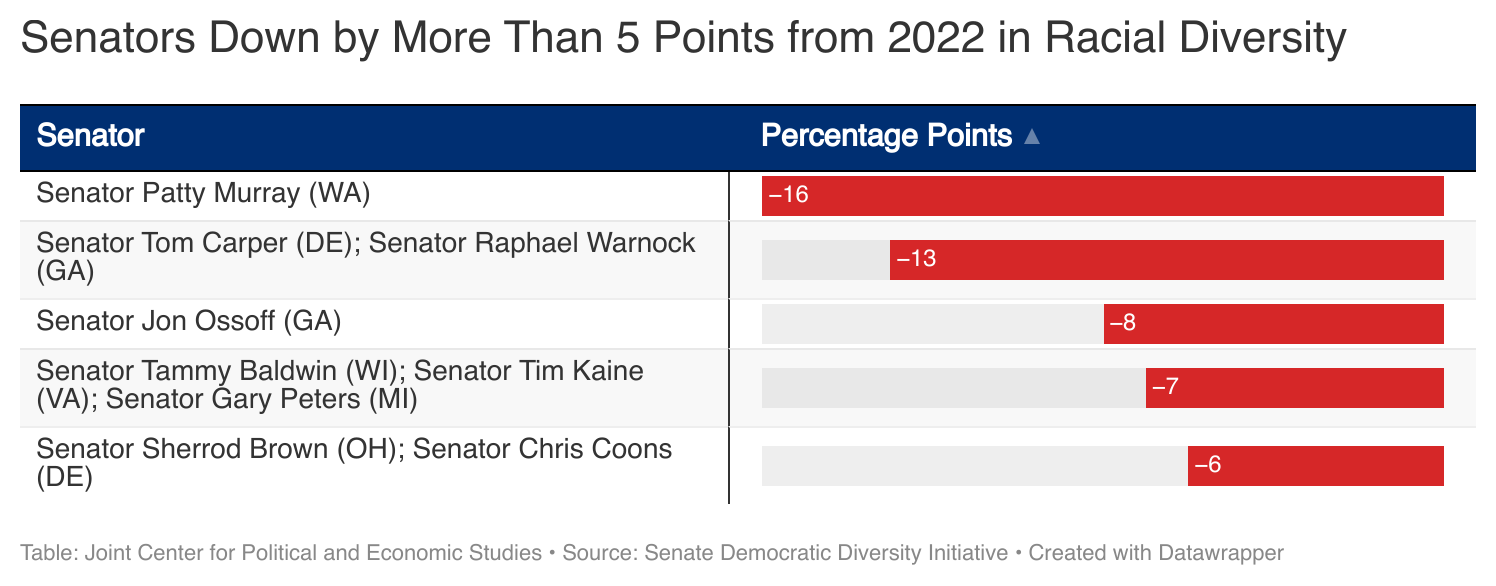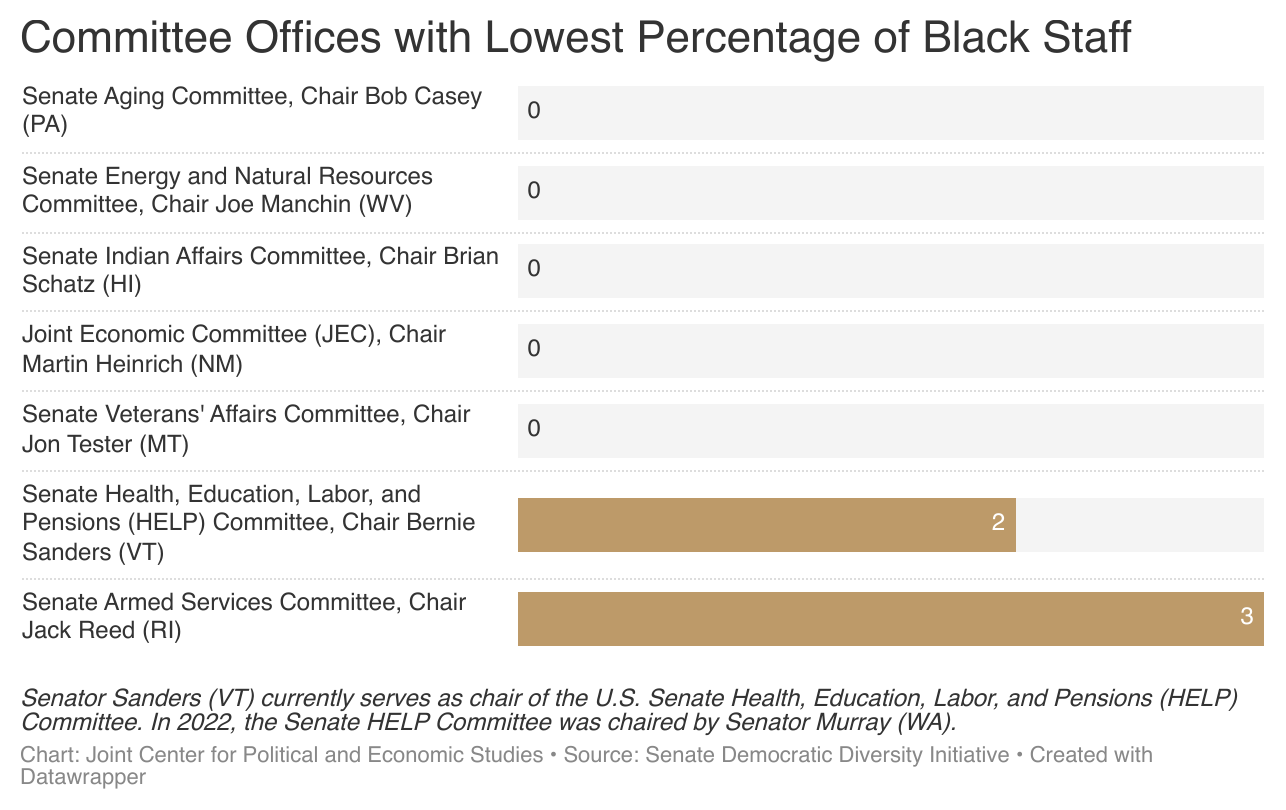Hill Diversity

Joint Center Ranks Senators Based on 2023 Senate Democratic Diversity Data
FOR IMMEDIATE RELEASE
July 13, 2023
Contact:
Chandra Hayslett, chandra@jointcenter.org
Joint Center Ranks Senators Based on
2023 Senate Democratic Diversity Data
WASHINGTON — The Joint Center for Political and Economic Studies commends Senate Democrats for releasing their seventh annual survey on racial, ethnic, gender, and sexual orientation/gender identity diversity of their staff. To date, Senate Republican offices have not released staff demographic data.
Our analysis includes over 20 graphics detailing the rankings of the top three personal and committee offices with racially diverse staff, and shows the personal offices with the most Black, Latina/o, Asian American/Pacific Islander, women, and LGBTQ staff. At 71, 68, and 67 percent respectively for racially diverse staff in personal offices, we found that Senators Mazie Hirono (HI), Brian Schatz (HI), and Cory Booker (NJ) have the most diverse staff.
Of the 51 Democratic Senate personal offices, 49 were included in our analysis comparing this year’s data to the 2022 survey results. Democratic Senators John Fetterman (PA) and Peter Welch (VT) are not included in this part of the analysis since they were elected in November 2022. Of these 49 personal offices, 21 reported an increase in the number of staff who identify as people of color, 21 reported a decrease, and seven remained unchanged. Of the 21 Senate Democratic personal offices who observed an increase, only 38 percent observed an increase of more than five percentage points.
Senators Kyrsten Sinema (AZ), Bernie Sanders (VT), and Angus King (ME) are Independent party members, but receive their committee assignments through the Democratic party. Senators King and Sanders also join Senate Democratic Caucus meetings.
Among majority committees, Senate Indian Affairs Committee (Chair Brian Schatz (HI)), Senate Small Business and Entrepreneurship Committee (Chair Ben Cardin (MD)), and Senate Banking Committee (Chair Sherrod Brown (OH)) have the most diverse committee staff. Over half of the staff on these three committees identify as people of color.
Five Democratic committees have no Black staff. They are the Senate Aging Committee (Chair Bob Casey (PA)), Senate Energy and Natural Resources Committee (Chair Joe Manchin (WV)), Senate Indian Affairs Committee (Chair Brian Schatz (HI)), Joint Economic Committee (Chair Martin Heinrich (NM)), and Senate Veterans’ Affairs Committee (Chair Jon Tester (MT)). Senate Health, Education, Labor, and Pensions Committee (Chair Bernie Sanders (VT)) staff is only two percent Black and Senate Armed Services Committee (Chair Jack Reed (RI)) is only three percent Black.
Chairmanship of the Joint Economic Committee (JEC) alternates between the Senate and House every Congress. This year, it is in the Senate, hence there are no 2022 JEC staff included in the analysis.
See below for five of the 21 charts and click here for the full analysis by Joint Center Senior Researcher Dr. LaShonda Brenson and Research Associate Kimberly Victor.





“It remains encouraging to see Senate Democrats continue to show transparency in publishing the percentage of top staff of color in their offices and the increase of staff diversity in 21 offices. While I applaud Senators Hirono, Schatz, and Booker for having two-thirds or more people of color on their staff, other Senators who have kept fewer people of color on their staff since last year still have ample opportunity for growth,” said Joint Center Senior Researcher Dr. LaShonda Brenson. “Senate Democrats should also disaggregate data by job title to show how many top staff positions are held by people of color, so existing disparities in representation can come to light. Disaggregating by job title also allows for a closer examination of potential systemic obstacles that might prevent people of color from obtaining higher-ranking positions. We applaud the Senate Democrats’ leadership on staff diversity, and look forward to working with them more on this issue.”
Background
Since 2015, the Joint Center’s Hill Diversity Program has researched and disseminated information on the importance of having a diverse congressional staff. Our findings can be found in our following reports and campaigns: “Racial Diversity Among Top Senate Staff” (2015); “Racial Diversity Among Top House Staff” (2018); “Racial Diversity Among Top Staff in Senate Personal Offices” (2020); “Racial Diversity Among Top Staff in the U.S. House of Representatives” (2022); “Racial Diversity Among U.S. Senate State Directors” (2022); “Digging Deeper: 2022 Senate Democratic Caucus Diversity Numbers” (2022); and Midterm Hiring Campaign/118th congressional tracker (2022).
Congress has since taken steps to improve transparency and staff diversity. For the past six years, Senate Democrats led both chambers by releasing racial/ethnic data about the staff in Democratic Senators’ personal and committee offices. Senate Democrats, however, have not disclosed the diversity of top staff.
Senators should establish a bipartisan Office of Diversity and Inclusion (OD&I) that develops a diversity plan that focuses on recruiting, hiring, training, promoting, and retaining a diverse Senate staff. In May 2022, the Joint Center, Demand Progress, and the National Association of Latino Elected and Appointed Officials Educational Fund prepared and submitted testimony for the Legislative Branch Appropriations Subcommittee urging it create an independent Senate OD&I office.
In April 2023, the Joint Center submitted testimony to the Legislative Branch Appropriations Subcommittee with Demand Progress and NALEO Educational Fund requesting the creation of a Senate Office of Human Capital that would “help strengthen the Senate workforce. This office could gather and publish demographic data and information about congressional staff in personal, committee, and leadership offices, helping to foster a stronger, more equitable and accountable chamber.”
The Joint Center for Political and Economic Studies, America’s Black think tank, provides compelling and actionable policy solutions to eradicate persistent and evolving barriers to the full freedom of Black people in America. We are the trusted forum for leading experts and scholars to participate in major public policy debates and promote ideas that advance Black communities. We use evidence-based research, analysis, convenings, and strategic communications to support Black communities and a network of allies.

